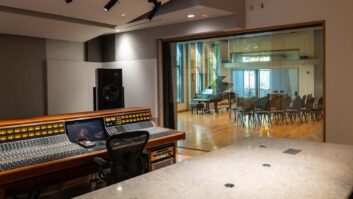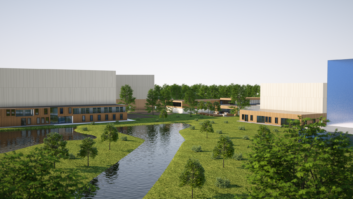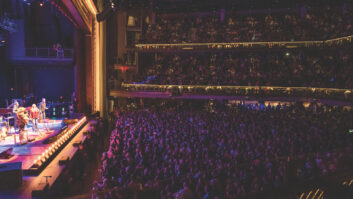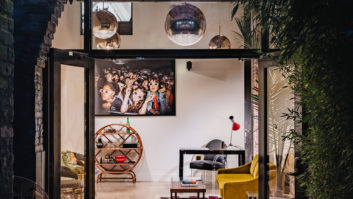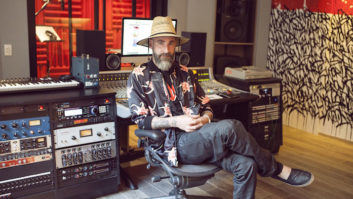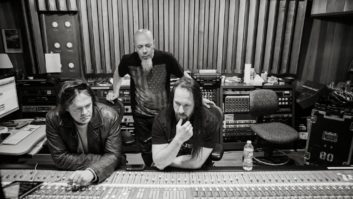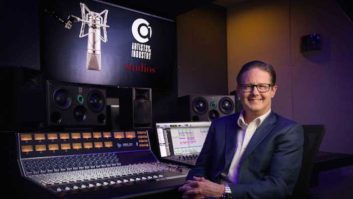Tom Burdett will leave the light on for you at Motel 6. But for those in the music business who need a slightly higher level of accommodation, here are a couple of U.S. hotels that come complete with recording studios of their own.
The Sunset Marquee, a show-biz legend from the days of rock ‘n’ roll excess in the 1970s and ’80s, has a full-sized recording studio on its parking lot level, fitted with a Euphonix CS3000 console, Tannoy DMT soffited main monitors and Sony PCM 800 MDMs, though most clients rent other media for sessions. The studio was built in the early ’90s by Jed Leiber, son of half the legendary songwriting team of Leiber & Stoller. A composer himself, Leiber stumbled onto the space, which had lain empty since the Synclavier Co. built it out a decade earlier as a showroom for its keyboard products.
“The thinking was that high-end musicians tend to stay here, so Synclavier figured it could sell them a few keyboards if they were in the hotel, too,” says Tom Fritze, the studio’s chief engineer and a former staffer at The Hit Factory in New York. Fritze stayed at the Sunset Marquee while working with Keith Richards on the Rolling Stones’ Bridges To Babylon record and never came back. “Jed was a New Yorker, too, and he started using it as a keyboard room when he came to L.A. to work on film scores,” Fritze adds. “It just kept growing.”
The original design was done in part by George Augspurger. Instead of square feet, the facility measures itself in terms of parking spaces-it takes up eight at the moment, and Fritze says an expansion is planned that might take another seven. Studio manager Annie Belanger can put together package deals that include studio time (which runs between $1,500 and $2,000 per day) and accommodations. And all the hotel’s amenities, from the pool and Jacuzzi to room service, are available to studio clients. Fritze says most of the studio’s work comes from clients (which include recent guests Aerosmith and Santana) who seek the studio first and the hotel second, though it occasionally works the other way, “when they stay here and then stumble on to the studio,” he says. (People seem to stumble a lot at the Sunset Marquee. Lord knows I have.)
The Marlin Hotel opened in November 1991 in Miami’s once-crumbling Art Deco South Beach area, part of a renaissance fueled in large part by hotel investments made by music business entrepreneur-turned-hotellier and Island Records founder Chris Blackwell. Three months later, South Beach Studios opened on the hotel’s ground floor. Now equipped with a 64-input SSL G Plus and Studer analog and Mitsubishi digital multitracks, South Beach Studios also puts together recording ($1,500 to $2,200 per day) and accommodations packages. Guests/clients can stay in the highly stylized rooms upstairs at the Marlin or at any of Blackwell’s other South Beach properties, including The Tides (ocean-front rooms, each with a telescope), The Kent, The Leslie, The Cavalier and the Governor.
Having that many hotel rooms is useful because those who seek out South Beach tend to stay for the season, says Joe Galdo, the cigar-chomping, golf-addicted studio president and A&R man for another of Blackwell’s companies, Palm Pictures. Mixer Tom Lord-Alge came down a few seasons ago (in South Beach, time is measured in seasons, not years) and never left; his eye-popping Dodge Prowler or Viper is almost constantly parked in front of the hotel. (And when you see what parking’s like in South Beach on a Saturday night in January, you realize that it’s good to be the king.) Aerosmith and producer Glen Ballard stayed at the Marlin in 1997, writing most of Nine Lives, with tielines down to the studio to flesh out parts that were later finalized at Criteria Recording in Miami Beach. That worked so well that Galdo commissioned designer Ross Alexander to turn room 305 into a mini-studio, complete with ISDN capability, vocal booth and Mackie console. Soundproof? They did their best, but you don’t go to South Beach for a rest. As they say on Ocean Avenue, with a nod to Warren Zevon, “You can sleep when you’re dead.”
